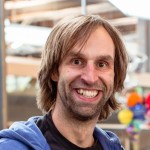By Eric Reynolds for Enlivening Edge
 I recently had the pleasure of speaking with Noah Thorpe, Co-Founder/Agile and Lean Adviser of Citizen Code. Citizen Code offers expert services in software development, customer development, lean product management, user experience and design, and growth and innovation strategy.
I recently had the pleasure of speaking with Noah Thorpe, Co-Founder/Agile and Lean Adviser of Citizen Code. Citizen Code offers expert services in software development, customer development, lean product management, user experience and design, and growth and innovation strategy.
Their website says: Your goal is ambitious. Your execution is crucial. We are your technical and strategic partner.
This is what they do, but it doesn’t speak to who they are and how they do it. They are also a quiet leader in the Teal revolution, not only walking their talk, but sharing it along the way. What you will read here is what happens when gifted developers focus their attention on self-organization.
“We were greatly inspired by Holacracy, Sociocracy, Morning Star self-management, and the tradition of self-organization stretching back to at least Norbert Wiener’s work on Cybernetics.”
Citizen Code’s constitution is not simply non-hierarchical, it’s also open-sourced and open to ongoing transformation. Hosted on GitHub, the constitution itself is created and continuously updated the same way as any other software project on the platform.
The constitution, which is the depository of rules, roles, and processes which govern according to the purpose and values of the organization, becomes a living product in itself, hypothetically making the organization as agile as its product management.
In other words, it’s like Holacracy, only simple, requiring neither licensing nor training.
In talking with Noah and researching him a bit online, it becomes clear that he’s also looking a byte further than simply being part of a self-organizing organization. He’s very much aware that self-organization is the generative basis of all life, and that a sustainable, self-organizing company cannot ultimately exist without a sustainable, self-organizing planet. Indeed, with Artificial Intelligence making complex investment decisions and auto-commerce automating many current aspects of business, not just organizations, all of society is on the cusp of a great transformation.
Underlying the “Teal” movement is a theory of human development which says that human beings evolve through stages of development as they mature, and so do their organizational systems. Teal, within the integral model, is a developmental stage in which a person begins to realize the interrelated, systemic nature of reality. As the benefits of this realization unfold, the shift begins to spread from persons and organizations to social and economic systems. In this vein, Noah sees a future of freelance workers who use constitutional organizing as a way of governing a self-organizing society.
Why is this important, aside from being a more effective way of “doing business”? Well, in these situations I often reflect on the concept of the singularity, the idea that AI and technology in general is about to make current science fiction look so last century. If this is the case, then we are not just about management structures, especially when we get into automated decision making. In a way, we are talking about coding the foundational relational and connective matrices of the next millennium. Literally, they are coding the matrix.
And the difference between Stephen Hawking and Elon Musk’s fear of us becoming slaves in service to machines, and Ray Kurzweil’s unbridled enthusiasm for the future, is being decided in how and why we do what we do NOW.
 Eric Reynolds received his MA in Transformative Leadership from the California Institute of Integral Studies and is currently researching the concept of Next Stage organizations for his PhD in Organizational Leadership and Transformation (OLT) at Saybrook University. He is a transdisciplinary scholar and Editor of Integral Leadership Review. He passionately bridges the many silos of human knowing, being, doing, and relating. [email protected], LinkedIn, Facebook
Eric Reynolds received his MA in Transformative Leadership from the California Institute of Integral Studies and is currently researching the concept of Next Stage organizations for his PhD in Organizational Leadership and Transformation (OLT) at Saybrook University. He is a transdisciplinary scholar and Editor of Integral Leadership Review. He passionately bridges the many silos of human knowing, being, doing, and relating. [email protected], LinkedIn, Facebook
Featured Image by onehundredseventyfive from Pixabay




